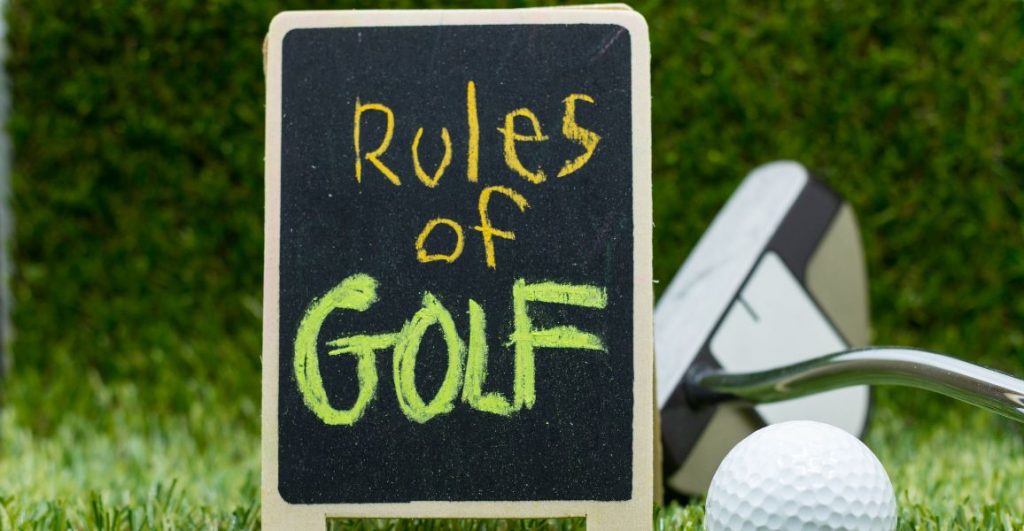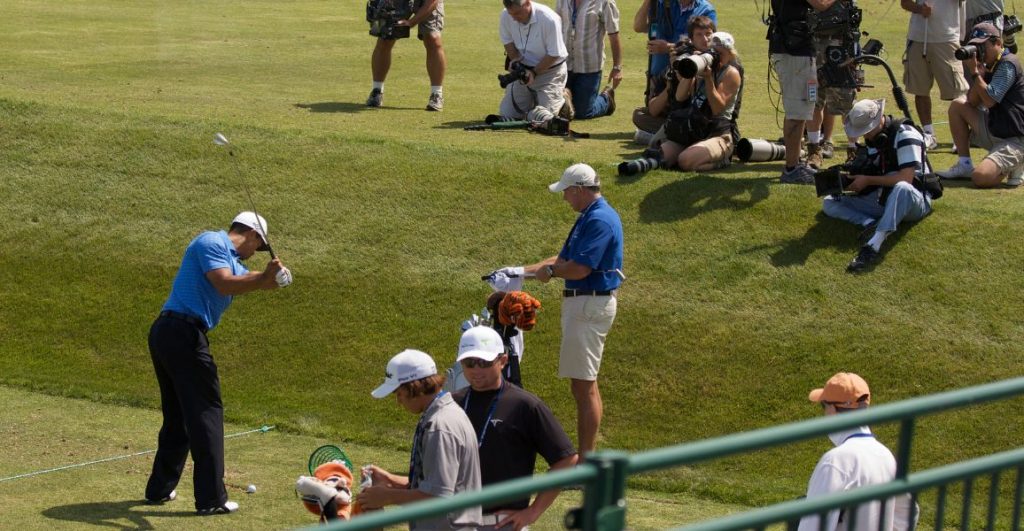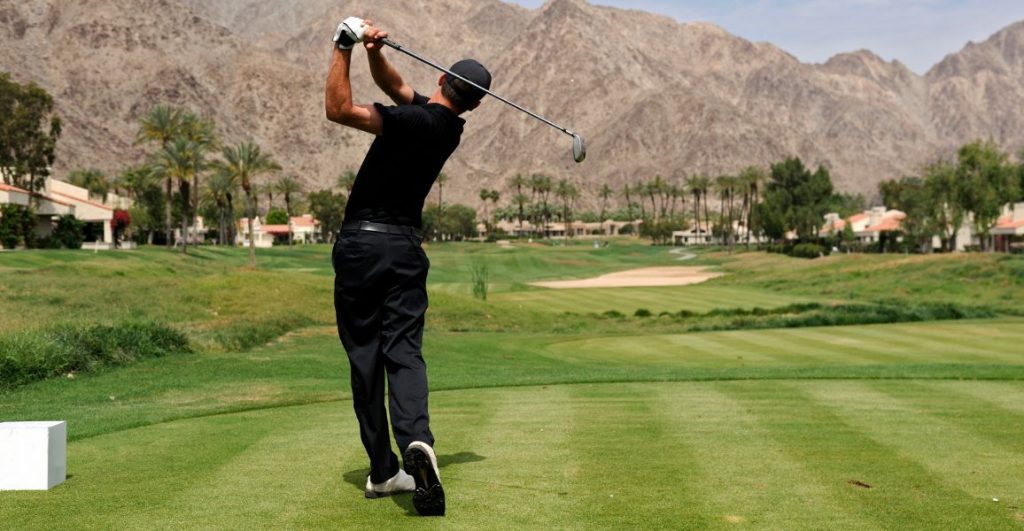WD is something you’ve more than likely seen next to a golfer’s name on a scoreboard at some stage.
You’ve probably asked yourself or one of your buddies from your golf club what does that even mean?
Well, you’re not alone and in this post today you will find out what it stands for, when it’s likely to appear, who it affects, and what happens to the golfer with the WD next to their name.
So What Does WD Mean in Golf?
WD stands for withdrawal and is commonly seen on golf tournaments or TV leaderboards.
WD will display beside a golfer’s name only if that golfer has played at least one round in the golf tournament or event. If a golfer gets injured before play begins you won’t see WD or their name on the scoreboard.
Technically they can’t withdraw from something they never started.
There are a few circumstances when a golfer may withdraw from an event which you will find out about in the following section.
When Can A Golfer Withdraw From An Event?

The Golfer Gets Injured
Golfers can withdraw from a golf tournament if they pick up a bad injury during play or between rounds. Injuries are common in professional golf due to the nature of the golf swing with the most common injuries being back, knee, or shoulder pain.
It’s completely up to the golfer with the injury if they want to play on or not. Some may try to soldier through on the PGA tour and others would prefer to live to fight another day.
Ultimately it’s about weighing up the negatives and positives.
For example, a golfer playing a really good round who picks up an injury will have a larger incentive to carry on playing than a golfer who has been chunking up the golf course all day.
The Golfer Becomes Sick
Golfers can withdraw from an event/tournament if they are not feeling well.
When you’re playing competitively your body and mind have to be close to 100% if you plan on playing well. An illness like a bad stomach bug, severe headaches/migraines, vertigo, or even a bad flu can make it difficult to play golf.
The PGA Tour and other tournaments/events have to allow players to pull out if they are sick because the golfer can’t help if they’re sick and it will prevent other golfers from getting sick and pulling out too.
The Golfer Has Personal Issues
Just like the rest of the population golfers will require time off in certain situations.
Are PGA Tour Golfers allowed? Absolutely!
Situations like poor mental health, a family emergency, the death of a loved one, the birth of a child, or anything that is out of their control will warrant some time off.
It all depends on the golfer and ultimately the golfer decides if they want to continue or not.
After all just because you see them on the PGA Tour doesn’t mean they are any different from the rest of us, they just have tons of money and can put the golf ball wherever they want…
The Golfer Has Given Up
Okay, this is not a legitimate reason for withdrawing from a competition and officials on the PGA Tour or in local competitions won’t be happy if you tell them this is why you’re pulling out.
Sometimes professional golfers have a bad day when they don’t feel in control of their golf game, they are having some bad luck on the course, or mentally they are just not with it.
On these days as we know scores can be higher than usual which can mean you have no chance of making the weekend cut or winning the competition.
This can entice golfers to withdraw so they can take themselves out of the situation and assess what went wrong and why.
The only thing is they can’t just say to the officials they don’t want to play so what do they do?
Well, like a high school student trying to get out of gym class, they fake an injury or illness so they can be sent home.
They just want to make sure it’s believable because it will be suspicious if they shoot a high score, and had no sign of an injury, only to be inflicted with one overnight.
What Happens When A Golfer Withdraws From An Event?

The Golfer Can Receive A Fine Or Penalty
Important to note that if a golfer has a genuine reason for withdrawing from an event and they don’t do so regularly they will not be at risk of being punished.
However, if a golfer does not have a legitimate reason for withdrawing or they have become known to do it often then they can be punished.
These punishments come in the form of suspensions or cash fines and how severe they will be depends on the offense.
For example, if a golfer withdraws from an event because they want to catch the second half of a NBA game they should expect a hefty fine or suspension.
The Golfer’s Record Will Be Affected
Golfers who don’t finish a round can see their official rankings affected. When they complete a round of golf that score will be counted and contributes to their scoring average stats.
Meaning if a golfer has two terrible rounds but then withdraws before the weekend those two rounds will still be counted.
This means that they can still fall down places in the world’s rankings even though they have withdrawn from the competition.
A loss in rankings can be the difference between being invited to some of the more prestigious tournaments/events and being left on the sidelines.
Other Golfer’s Positions Will Change
When a golfer is removed from the golf leaderboard it affects all the other players’ ranks in the golf tournament.
This can make a huge difference for professionals whose pay for the tournament depends on how well they do.
For example, the difference in prize money a golfer receives for coming first instead of second in the US Open is $1,292,000. (2nd Place – $1,708,000 / 1st $3,000,000).
Meaning a golfer could be losing by a few strokes on the last day but if the golfer in first place has to withdraw due to an injury, illness, or personal issue they will receive a larger cheque than expected.
This carries on down through the entire rankings for the day with almost everyone getting a pay increase as a result of the withdrawal.
Who Else Does It Affect When Golfers Withdraw From An Event?

The Fans
The most important people who are affected by a withdrawal are the fans who come to support the event.
Depending on who the golfer is that withdraws it can make or break some fan’s experience of the event.
For example, if a big fan favorite like Tiger Woods withdraws from an event will be a big loss, but if it’s a PGA Tour golfer who’s a rookie, not so much.
Many fans would have bought their tickets so they can watch their favorite golfers/childhood heroes play the game they love. If the golfer they came for can’t play the fans can feel let down.
The Sponsors
PGA Tour golfers have a sponsor of some sort. These sponsors pay golfers to wear their clothes or use their golf clubs when they are playing golf.
These players ideally play well, get a lot of screen time, win the event, and win over some new fans for both them and the brands they are tied to.
Essentially, the sponsors get advertisements every time the golfer is seen with their gear. This means if a golfer withdraws then their chance of advertising to the fans watching that player is gone.
Ideally, they want a golfer who plays well and plays often to get the most bang for their buck.
Meaning if a golfer is constantly withdrawing it affects the sponsors and potentially the agreement between the two.
How Golfers Can Avoid Having To Withdraw From An Event

Strength Training
Working on strengthening your muscles will not only help you on the golf course but it will help you stay on the golf course.
Lifting weights, swinging kettlebells, or making use of equipment like a rowing machine will improve your golf game and prevent injuries.
That being said if you’re not training safely with the incorrect form it could have the opposite effect.
Keeping you off the golf course and sore all over.
Mobility Training
Being able to fully swing without any restrictions is the goal of the golf swing. A smooth and unrestricted swing will serve you better than a short and powerful swing.
Flexibility training is essential for avid golfers who want to prevent injuries on the course.
Even if it’s a simple back stretch routine or a weekly yoga session every golfer can benefit from being able to move their body freely.
